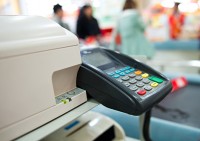President Donald Trump’s proposed 25% tariffs on about 1,300 Chinese products worth $50 billion have the merchant-acquiring industry worried.
The Electronic Transactions Association, a national payments-industry trade group, joined more than 100 other organizations in signing a letter to the House Ways and Means Committee leadership expressing their “deep concern” about the proposed tariffs. Many point-of-sale terminals and related payment-processing products used by U.S. merchants are made in China and could be subject to the tariffs.

VeriFone Systems Inc., the largest U.S.-based POS terminal maker, uses contract manufacturers in China, Singapore, Malaysia, Brazil, and Germany, as well as components suppliers located throughout the world. VeriFone did not respond to a Digital Transactions News request for comment, but in a recent regulatory filing the San Jose, Calif.-based company said “a material portion of these third-party manufacturing activities are concentrated in China.” The filing did not give a figure.
Other POS terminal providers with a large U.S. presence, including France-based Ingenico and China’s Pax, did not respond to requests for comment by mid-afternoon Thursday.
While the trade-group letter notes that “China’s ongoing intellectual property rights violations, forced technology transfers, and state interventions harm U.S. companies, workers, consumers, and our competitiveness,” it says the planned tariffs are not the best way to solve those problems.
Talbott notes that in addition to the extra costs for Chinese-made POS equipment, the tariffs may tempt non-Chinese suppliers to the acquiring industry to raise their own prices, though probably not as much as 25%. “I think that it’s difficult to ignore the upward pressure on prices that tariffs have,” says Talbott.
Various Congressional committees, including Ways and Means in the House and the Senate Finance Committee’s Subcommittee on International Trade, Customs, and Global Competitiveness, held hearings this week about the tariff proposal. President Trump, however, under current law has authority to impose them without express approval from Congress.
The U.S. International Trade Commission, a part of the executive brach, is planning a mid-May hearing to take input about the tariffs. Talbott says the ETA will submit written comments to the commission and is planning to give testimony at the hearing.






